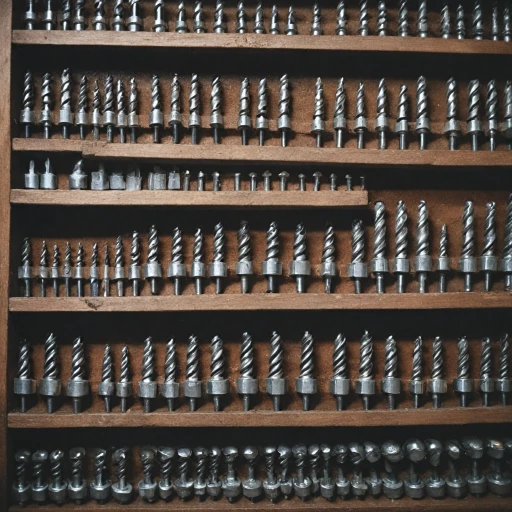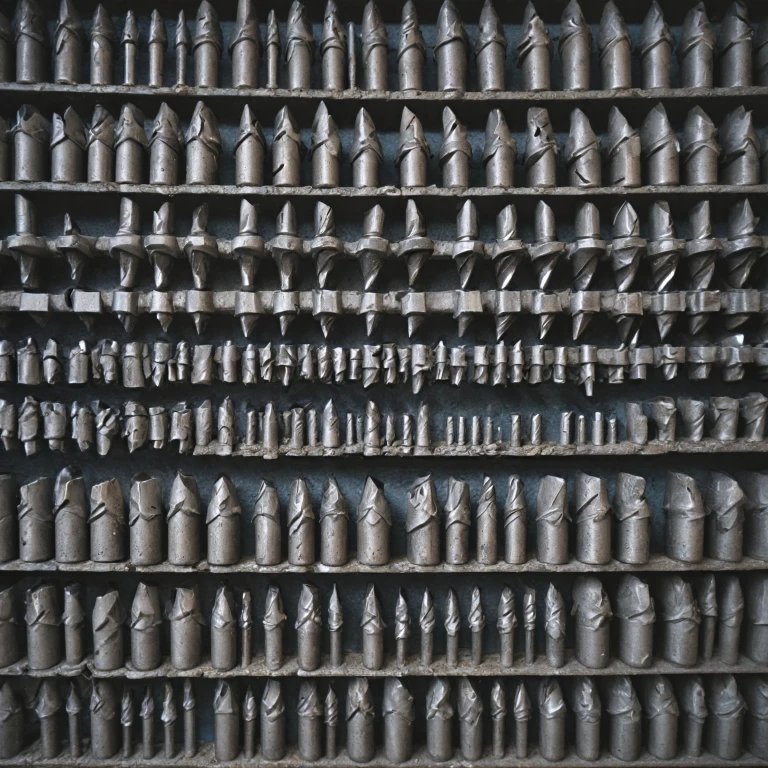The Role of Drill Bits in Cordless Drill Sets
The Essential Nature of Drill Bits in Power Tools
Drill bits are indispensable components when it comes to cordless drill sets. They are the business end of the drill, the crucial parts responsible for creating holes in various materials from wood to steel. The drill bit’s role is essential, as it directly influences the effectiveness and efficiency of the cordless drill set. With the right bit set, these power tools can tackle a wide range of jobs with precision and ease.
Understanding the varieties of drill bits available can make the difference between a smooth task and a challenging one. Each bit is designed for specific jobs, which aids in customizing the tool's capabilities to suit different materials. This customization extends the versatility of your drill and sets the foundation for successful project outcomes.
The twist drill, for instance, is immensely popular due to its high-speed steel construction and efficiency in material removal. This type of bit is known for its durability and capability to handle tough jobs without quick wear. Meanwhile, the carbon steel bit offers a different advantage, suitable for softer materials. Choosing wisely paves the way for a hassle-free drilling experience.
Additionally, the market for drill bits has seen various technological advancements. These innovations have led to the emergence of bits constructed from robust materials such as titanium and cobalt, which offer even higher durability and precision. While selecting drill bits, individuals should consider reviews and expert opinions to make informed decisions.
Understanding the role and versatility of drill bits is key to maximizing the capabilities of your cordless drill set. With an array of options available, knowing which bit to use and how to maintain it ensures your power tools perform at their best. For more in-depth exploration, the
role of masonry drill bits in cordless drill sets provides additional insights.
Types of Drill Bits and Their Uses
Various Drill Bit Types and Their Applications
Understanding the different types of drill bits available in your cordless drill set is crucial for achieving successful results in any project. Each bit is specifically designed for particular materials and applications, offering versatility in the tasks you can accomplish with your drill.
Commonly Used Drill Bits
- Twist Drill Bits: These are the most common type, ideal for general-purpose drilling in wood, plastic, and light metal. Their spiral design allows for efficient cutting and removal of debris.
- High-Speed Steel (HSS) Bits: Known for their durability, HSS bits can handle a variety of materials, including metal and hardwood, thanks to their resistance to heat and wear.
- Carbide-Tipped Drill Bits: Equipped with a robust carbide tip, these bits are excellent for drilling into hard materials like tile and masonry, providing precision and longevity.
- Brad Point Bits: Perfect for wood, these bits have a sharp tip that helps maintain accuracy by preventing the bit from wandering.
Specialty Drill Bits
- Hole Saw Bits: Used for cutting larger holes, these bits are perfect for service installations such as pipes and wiring. Read more about the versatility of hole saw drill bits.
- Forstner Bits: Producing flat-bottomed holes, Forstner bits are ideal for woodworking tasks like creating mortises or counterbores.
- Spade Bits: Known for their wide, flat blade, spade bits are great for quickly creating large holes in wood.
The choice of drill bit goes beyond material considerations; it's also about the finish and size of the hole you want to achieve. Choosing the wrong bit can result in poor work quality or even damage to the tool or material. Reviewing the
versatility of an 18 drill bit in cordless drill sets can offer insight into how different sizes and types can be utilized for various jobs.
Choosing the Right Drill Bit for Your Project
Picking the Perfect Drill Bit for Your Tasks
Selecting the appropriate drill bit is crucial for the satisfaction and success of any project. With a plethora of choices available, picking the right bit can simplify your work and enhance your outcomes.
To make an informed decision, you have to understand the nature of the material you’re working with. For example, simple woodwork might only require high-speed steel bits, while tougher materials might need carbide-tipped or twist drill bits. Likewise, if you're drilling into masonry, a masonry bit might be required. Each bit set is tailored for specific jobs, so take the time to identify which bit fits your needs.
When browsing through reviews, it can be helpful to seek a bit that aligns with your specific project requirements. Websites like Rotten Tomatoes might review movies like "Drillbit Taylor," but reviewing tools and jobs calls for specific drill review platforms.
Additionally, consider the size of the bit in relation to the hole you want to make. Overestimating or underestimating can drastically affect the results. Whether you're an experienced tinker or just starting out, matching your bit to the project is pivotal.
A crucial tip is to embrace modern advancements in drilling technology. With innovations in drill bits emerging routinely, staying updated on current models ensures you’re always equipped with the best tool for the service at hand.
If you're still unsure about certain material or bit—be it high-speed steel bits, carbon steel bits, or others—research can be enlightening. One resource that provides insights into the nuances of tasks such as tile drilling with cordless drills is a guide on
perfecting the art of drilling into tile.
Matching your bit to your objective ensures precision and efficiency, ultimately making your projects more enjoyable and successful. Always aim to select your bits using a holistic approach that considers material, innovation, and impactful reviews.
Maintenance Tips for Drill Bits
Preserving the Efficiency and Longevity of Drill Bits
Maintaining drill bits is crucial to ensure they remain efficient and have a long lifespan. Whether you frequently undertake various jobs or are an occasional user, these maintenance tips will help keep your drill bits in pristine condition:
- Regular Cleaning: After each use, clean the drill bits to remove any debris or residue. This not only prevents rust but also ensures that the bits can perform their best the next time you use them.
- Proper Storage: When you're not using your drill bits, store them in a cool, dry place. Using a drill bit clip or a dedicated bit set box can help prevent damage and keep them organized.
- Sharpen as Needed: Dull bits not only make work harder but can also damage the material you're working on. Use a sharpening tool suited for your bit type—be it twist drill or other specific designs.
- Keep an Eye on Wear and Tear: Especially with jobs requiring high speed steel bits, checking for wear regularly can prevent accidents and maintain the quality of the holes produced.
- Choose the Right Material: Investing in high-quality materials like carbon steel can make a significant difference in the bit's longevity and performance.
- Avoid Overheating: Overheating can occur during use, especially in materials that are thicker or more resistant like steel. Using a lubricant can reduce friction and help manage heat efficiently.
Implementing these maintenance tips means that your drill bits can provide reliable service and reduce the chances of encountering common mistakes such as reduced efficiency or premature failure during important tasks.
Innovations in Drill Bit Technology
Advancements in Drill Bit Technology
In the world of cordless drills, the evolution in drill bit technology has been remarkable. Technological advancements have enhanced the efficacy, durability, and precision of bits, making cordless drill sets even more versatile for various jobs. The integration of high-speed steel and carbon steel provides a vast range of applications, from simple home tasks to heavy-duty industrial work.
Recent innovations include coating enhancements such as titanium nitride, increasing the lifespan of the bits by reducing friction and heat during operation. Another significant development is in twist drill bit design, offering improved chip evacuation and hole precision, enabling smoother operation and lower wear and tear on both the bit and the drill.
Moreover, the emergence of smart detection software in modern drill bits helps in detecting and preventing issues like over-penetration, safeguarding both your project and tools. This aligns with the trend of smarter tool services and service efficiency, helping to minimize common pitfalls.
Overall, these technological strides not only improve the performance of cordless drills but also expand the scope of what can be accomplished, encouraging users to explore more complex projects with confidence. Enhanced by innovation, selecting the right bit set has never been more critical for achieving the best results in your projects.
Common Mistakes to Avoid with Drill Bits
Avoiding Pitfalls in Drill Bit Usage
When working with cordless drill sets, it's important to recognize and avoid common mistakes that can affect the quality of your work and the lifespan of your tools. Understanding these missteps helps ensure the longevity and performance of your drill bits, ultimately leading to better results and a more efficient drilling experience.
First, selecting the wrong drill bit can lead to inefficiency and possible damage. As covered earlier, the various types of drill bits, like twist drills or those made from high speed steel or carbon steel, are designed for specific jobs. Using, for example, a bit designated for wood on steel can quickly wear out the tool.
Another mistake is neglecting the maintenance of your drill bits. Consistent upkeep, such as regular sharpening and cleaning, is crucial. This not only saves time when tackling multiple jobs but also extends the life of the drill bits. Bits drill users often overlook the impact of using dull bits, often due to inadequate maintenance, which can result in increased effort and poor hole quality.
It's also common to apply excessive force when drilling. This can cause the drill bit to overheat and lose its efficacy. Instead, let the drill and its bit do most of the work by ensuring proper alignment and applying gentle pressure. This promotes efficient drilling and prevents your tool from being compromised.
Finally, ignoring the specific recommendations about speed settings can negatively impact both the bit and the material. For instance, when drilling through harder materials, it’s essential to adjust to the appropriate speed setting, preventing unnecessary wear and tear on your drill bits.
By avoiding these common pitfalls, one can fully leverage the capability and longevity of their drill bits while preventing any unnecessary work and tool degradation.

